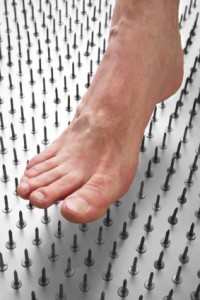The word neuropathy is from a combination of the words “nerve” and “pathology”. The word peripheral means away from the center of the body, meaning in the extremities. Peripheral neuropathy is nerve damage that generally starts at the tips of the fingers and/or toes and gradually works its way up to involve the hands and/or feet. It can move further up the limbs as it becomes more severe. The nerve damage is experienced by the patient as either a burning sensation, pain, numbness, tingling or possibly poor muscle control. It is generally felt in both hands or feet (as opposed to something like carpal tunnel syndrome, which only affects one hand). When the feet are severely affected it can result in poor balance and a tendency to fall.
There are a number of causes of peripheral neuropathy. It is commonly seen in alcoholics and people with diabetes. It can also be the result of genetic disorders like Charcot-Marie-Tooth disease, or Friedreich’s ataxia. Systemic problems like vitamin deficiency (especially a thiamin or vitamin B12 deficiency), pernicious anemia, or kidney failure can also result in damage to the peripheral nerves. Infections, like AIDS, Lyme disease, or syphilis can also result in peripheral neuropathy. Other causes include heavy metal or chemical poisoning, direct damage to the nerve and poor circulation in the extremities.




